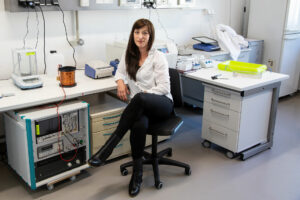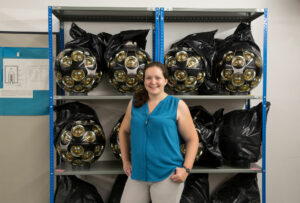Two ERC Starting Grants for Prof. Dr. Danijela Gregurec and Prof. Dr. Anna Nelles

Sensory Sciences and Neutrino-Forschung
Funding from the European Research Council (ERC) is highly competitive. Receiving this funding not only provides researchers new impetus because of the high funding amounts of up to 1.5 million euros over a period of five years, but also recognizes the recipients as top-level researchers in their fields. Two FAU researchers of the Faculty of Sciences have now been awarded an ERC Starting Grant: Danijela Gregurec, Professor for Sensory Sciences and Anna Nelles, Professor for Experimental Astroparticle Physics, who also works as a researcher at DESY.
Bimodal neuromodulation enables reading and writing in the brain

Neurodegenerative diseases and neurological dysfunction such as depression, Parkinson’s disease or dementia are affecting ever-growing sections of our society. Innovative approaches in neuroscience are required to treat these conditions effectively. Up to now, neuromodulation has usually been based on permanently implanted macroscopic hardware, which raises many safety concerns, is often not sufficiently precise and does not allow access to deeper regions of the brain.
This is where the ERC Starting Grant project called BRAINMASTER led by Prof. Dr. Danijela Gregurec comes in: Her goal is to develop an innovative bimodal, wireless and minimally-invasive system for neuromodulation that will facilitate precisely positioned and timed treatment of neurological diseases.
Functional magnetic nanoparticles form the basis of the project. These particles can be accurately positioned and activated in the brain using focused ultrasound and external magnetic fields. Magnetic resonance imaging is used to analyze the neural reaction in real time. The bimodal function enables cell-specific stimulation and simultaneous analysis of neural activity.
BRAINMASTER will thus facilitate neuromodulation without implants that can detect neuron inactivity on the cellular level and trigger the required therapeutic stimulation of affected areas of the brain within a matter of milliseconds. This means that Grecurec and her team are developing the first intuitive interface between the deep brain and a technical system in order to simplify potential cognitive training and therapies for developmental, neurodegenerative and mental conditions.
Danijela Gregurec was appointed Professor of Sensory Sciences at the Department of Chemistry and Pharmacy at FAU at the end of 2020. She is one of the pioneers in the field of magnetic wireless neuromodulation.
Prof. Dr. Danijela Gregurec studied applied chemistry at the University of Zagreb, Croatia. She carried out research in the fields of molecular biology and biomedicine at the Centro de Investigación Cooperativa en Biomateriales (CIC biomaGUNE) in San Sebastian, Spain, where she completed her doctoral degree in 2016.
She subsequently moved to the Massachusetts Institute of Technology (MIT, Cambridge, USA), where she worked in the electronics research lab and at the McGovern Institute for Brain Research.
Searching for cosmic neutrinos

Prof. Dr. Anna Nelles, who conducts research at FAU in her role as professor of experimental astroparticle physics and also works as a researcher at the Deutsches Elektronen-Synchrotron DESY in Zeuthen (host institution for the ERC grant), is setting up a network of radio antennas in Greenland in order to detect extremely energetic neutrinos from space.
Neutrinos are volatile elementary particles that can be stopped by almost nothing. They can pass unhindered through walls, planets and entire galaxies and thus reach us from the farthest corners of the cosmos and from the center of extreme processes such as supernova explosions of stars or from the dust disks around black holes.
Some of these particles have the same amount of energy as a table tennis ball that has been hit with high force. Tests have shown that the high-speed neutrinos leave radio waves behind on their path through the atmosphere and the ice sheets in Greenland that can be detected with special antennas.
“The discovery of neutrinos with extreme amounts of energy promises to yield new findings both in astrophysics and particle physics with energy levels far beyond those achieved with particle accelerators on Earth,” explains Nelles. “We hope to discover new sources of extremely energetic cosmic rays with these observations and gain a better understanding of how these particles are distributed in space.”
The Radio Neutrino Observatory – Greenland (RNO-G) will be the first large observatory of its kind and will be set up on 35 stations by 2026. Nelles and her colleagues from the USA and Belgium are responsible for setting up and operating the observatory.
In 2019 Dr. Anna Nelles was appointed Professor of Experimental Astroparticle Physics, specializing in radio detection of neutrinos at FAU. She also works as a researcher at DESY in Zeuthen.
Nelles studied physics and business studies (MBA) at RWTH Aachen before completing her doctoral degree in physics at Nimwegen University in the Netherlands. This was followed in 2015 by a period as a postdoctoral researcher at the University of California.
Before coming to FAU, she worked as the head of an Emmy Noether research group at Humboldt Universität zu Berlin.
Contact:
Prof. Dr. Danijela Gregurec
danijela.gregurec@fau.de
Prof. Dr. Anna Nelles
anna.nelles@fau.de
